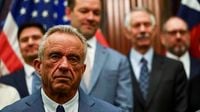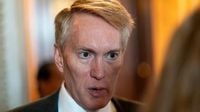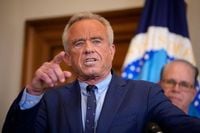In a dramatic turn for U.S. public health, the Centers for Disease Control and Prevention (CDC) has been rocked by a wave of high-profile resignations, escalating political interference, and sweeping changes to national vaccine policy. The events of early September 2025 have left experts deeply concerned about the nation’s readiness to confront infectious disease threats, as well as the growing mistrust around childhood vaccination—a topic now at the center of heated national debate.
On September 2 and 3, at least five top CDC officials, including Demetre C. Daskalakis, director of the National Center for Immunization and Respiratory Diseases, and CDC Chief Medical Officer Debra Houry, stepped down. Their departures came in the wake of the ouster of newly confirmed CDC Director Susan Monarez, who had held the position for less than a month. According to The Hill, these resignations coincided with the announcement by Health and Human Services (HHS) Secretary Robert F. Kennedy Jr. of new policies sharply restricting access to COVID-19 vaccines.
The CDC has long been regarded as the nation’s leading authority on infectious disease control, but the recent exodus of leadership has sent shockwaves through the public health community. Daskalakis, in his resignation email, cited the “ongoing weaponizing of public health” as his reason for leaving. Houry echoed these sentiments, writing, “For the good of the nation and the world, the science at CDC should never be censored or subject to political paused or interpretations. Vaccines save lives — this is an indisputable, well-established, scientific fact.” She further warned that overstating vaccine risks and the rise of misinformation had already cost lives, pointing to the highest number of U.S. measles cases in three decades and a recent violent attack on the CDC’s Atlanta headquarters that claimed the life of a police officer.
Mark Zaid, attorney for Monarez, released a statement on her behalf, saying, “When CDC Director Susan Monarez refused to rubber-stamp unscientific, reckless directives and fire dedicated health experts she chose protecting the public over serving a political agenda. For that, she has been targeted.” Monarez, according to her legal team, had neither resigned nor been officially fired by the White House.
Meanwhile, HHS Secretary Kennedy, a longtime critic of vaccines, has taken unprecedented steps to reshape federal vaccine policy. In June 2025, he replaced all 17 members of the CDC’s vaccine advisory committee with individuals, some of whom are openly skeptical of vaccines. Many states rely on this committee’s recommendations to set school vaccine requirements. Kennedy also rescinded federal recommendations for childhood COVID-19 vaccination in May, and this week, the Food and Drug Administration (FDA) further restricted access to updated COVID-19 shots. Under the new rules, only individuals 65 and older or those at high risk for severe illness can receive the vaccine without additional hurdles. Healthy children under 18 now require a consultation with a medical provider before vaccination, removing the option for parents to simply bring their children to clinics or pharmacies for shots.
The American Academy of Pediatrics (AAP) has called these restrictions “deeply troubling.” Dr. Jesse Hackell, chair of the AAP’s Committee on Pediatric Workforce, told Stateline, “I don’t want to force anybody, but I do want to make sure that the information they’re getting is quality information — and that’s not what is coming from HHS.” Hackell also expressed concern for vulnerable children who receive vaccines through the federal Vaccines for Children (VFC) Program, saying, “If you’re covered by VFC, which is basically kids on Medicaid and a few other populations, then you’re out of luck. To me, that’s a huge inequity in access to care, which is indefensible.”
Experts warn that these policy shifts and the accompanying wave of misinformation are already having a measurable impact. Vaccination rates among children are on the decline, and nonmedical exemption rates—those granted for religious or personal reasons—are climbing. According to the CDC, nonmedical exemptions among kindergarteners have risen from 1.9% in 2020 to 3.4% for the 2024-25 school year, with 17 states reporting exemption rates above 5%. In Florida, where Dr. Rana Alissa practices pediatrics, the rate has jumped from 2.7% in 2020-21 to 4.8% in 2024-25. “We are endangering each other,” Alissa, who is also president of the Florida Chapter of the AAP, told Stateline. She says vaccine skepticism, once rare, is now a daily occurrence in her clinic.
Five states—California, Connecticut, Maine, New York, and West Virginia—do not allow nonmedical exemptions. Yet, in January, West Virginia’s governor issued an executive order mandating religious exemptions, prompting lawsuits from families with immunocompromised children and support from Kennedy’s HHS. The agency warned state health departments that denying such exemptions could constitute civil rights violations.
The consequences of falling vaccination rates are already visible. Preliminary CDC data showed more than 9,000 cases of whooping cough (pertussis) by April 2025—about double the number seen the year before. Whooping cough can be deadly for infants, and vaccines are the primary defense against severe illness. Hackell, recalling his early days as a pediatrician before the introduction of key vaccines, said, “When I trained, we didn’t have these vaccines, and these kids kept us up at night. I never want to practice in those days. … That is unacceptable to submit my patients to those risks that we’ve been able to reduce.”
New limits on COVID-19 vaccines for children have also raised alarms. The FDA recently removed Pfizer’s shot for children under 5 from emergency use authorization and limited Moderna’s Spikevax to children with at least one serious health condition. The AAP continues to recommend COVID-19 vaccination for children as young as 6 months, especially those with underlying health issues, and supports offering the shots to healthy children whose parents request them.
Between September 2023 and August 2024, 152 children died of COVID-19 and 213 died of flu, according to CDC data highlighted by Dr. Paul Offit of the Children’s Hospital of Philadelphia. “It’s the most vulnerable among us that will suffer, and that will be our children,” Offit told Stateline. He voiced concerns that the federal government’s removal of data could soon extend to vaccination figures, warning, “What worries me the most is we’re not going to know the degree that we’re suffering. … The CDC is losing its capacity to do adequate surveillance across the country.”
Senator James Lankford (R-Okla.), appearing on NBC’s “Meet the Press” on September 1, 2025, distanced himself from vaccine-autism theories, stating, “I don’t connect those two. … The science has debunked links between autism and vaccines for more than 20 years.” Yet, Kennedy has continued to claim that vaccines and environmental factors are likely behind the rise in autism diagnoses, promising announcements in September about “interventions … now that are clearly almost certainly causing autism.” Most experts, however, attribute the increase in autism diagnoses to improved detection and broader diagnostic criteria.
As the nation faces ongoing outbreaks—Texas recently declared its measles outbreak over, while New Mexico still battles new cases—many in the public health community warn of a dangerous “normalization” of vaccine-preventable diseases. “We need to make sure that kids are protected against the diseases that they can be protected against, because we truly are in a vulnerable state right now,” said Rekha Lakshmanan, chief strategy officer at The Immunization Partnership, to Stateline.
With the CDC’s leadership in flux, vaccine policies shifting, and public trust at a low ebb, the coming months will test America’s ability to safeguard its children—and its future—from preventable diseases.



